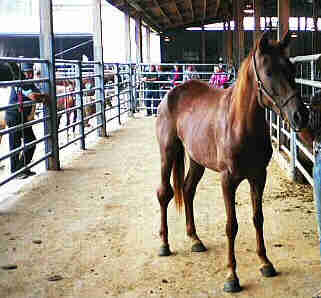
Horse Slaughter
Horse Transport
Horse Cruelty
Horse Rescue
Legislation
Stolen Horses
Press
General
SiteMap
Horse Cruelty Info
PA Anti-Cruelty Law
Title 18, Section 5511
Henneke Body Scoring Condition Chart
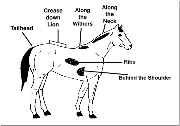 The Henneke Body Scoring Chart is accepted in court as a scientific method of scoring a horse's body condition. It is used successfully in court to prove neglect.
The Henneke Body Scoring Chart is accepted in court as a scientific method of scoring a horse's body condition. It is used successfully in court to prove neglect.
Horse Cruelty Cases
Horse Cruelty at Auctions
Successful Enforcement

PA State Police arrest horse dealer at PA horse auction
PA State Police Enforce
PA Cruelty Law at New Holland, PA Auction
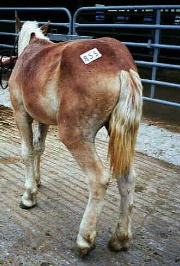
Young draft gelding shipped from NC displays injured left hind leg. A PA equine vet determined that there was no fixing this horse's injured leg. He was humanely euthanised.
No Enforcement
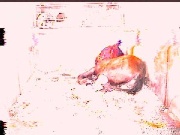
Down and bleeding inside a trailer with Maine license plates at a New Holland, PA auction. Reportedly the horse later died. No charges were ever filed. Blood was pooling on the ground under and outside the trailer.
The Downer Hall of Shame

Down Belgian was down all day at a PA horse auction. Several bystanders attempted to get the horse to rise. A vet was never called...
The Labor Day Mares
 Severely foundered mare's face reveals the pain she is feeling. Mare was found down on a truck at a New Holland auction. Blood oozed from her coronary bands.
Severely foundered mare's face reveals the pain she is feeling. Mare was found down on a truck at a New Holland auction. Blood oozed from her coronary bands.
A Mule & 2 Standardbreds-
All Had Broken Legs & were Hidden on A Trailer
No Water

Water tank is empty, even though the faucets work..
The Horse the Killers Refused
& the vet passed.
Unfit Horses Sold at Auction
PSPCA allows sale - NHPD files charges, owner pleads guilty.
Links
California Voters "Just Say Neigh" to Horse Slaughter!
HoofPAC
Shop online at IGive.com with over 600 great stores you know & love- including Back In the Saddle! Up to 26% of the purchase price is donated to the EPN!
Join today!The EPN gets $5 extra the first time you shop!
PayPal accepts credit cards! Please send your tax deductible donation to the:Equine Protection Network, Inc.,
P. O. Box 232, Friedensburg, PA, 17933.
HoofPAC is the political action committee that has been formed to end the slaughter of America's horses. Cathleen Doyle, founder of HoofPAC, led the successful Save The Horses campaign in 1998 that made the slaughter of California's horses a felony.
Contact the EPN
Did You Know?
"Only ignorance! only ignorance! how can you talk about only ignorance? Don't you know that it is the worst thing in the world, next to wickedness? - and which does the most mischief, heaven only knows. If people can say, "Oh! I did not mean any harm", they think it is alright."....
John in Black Beauty by Anna Sewell published in 1877
Page last revised on:

Horse Cruelty- Selling or Using a Disabled Horse
PA and many other states have laws against selling sick, lame, or debilitated horses and laws that limit the transport of these horses except for limited purposes. All of the horses on this page and at the links, were sold in violation of PA law as demonstrated by the guilty verdicts in New Holland Court. All of the horses sold at New Holland were during a time that Dr. Holt was employed by New Holland Sales Stables. In all of the cases there were horse welfare organizations that either failed to cooperate with law enforcement, interfered with law enforcement, or just plain failed to report the crime.
An employee of a business that benefits from the sale of an item, in this case a horse, is not the person to determine if it is a violation to sell the horse. Any vet employed by an auction/livestock market has a conflict of interest with law enforcement.
A vet does not determine whether or not the cruelty law has been violated. The court does that.
A vet does not determine whether or not the elements of a crime of cruelty have been met, an officer trained in law enforcement does that.
A vet is the medical expert that determines the medical condition of the horse.
Horse welfare organizations fail to realize that the law applies to them also. If a dealer or "killer buyer" cannot transport the horse to New Jersey, then neither can they transport the horse to New Jersey. The nearest appropriate place for medical treatment from New Holland is New Bolton Center, less than 45 minutes away. The law does NOT apply to people purchasing horses, only those selling or transporting. The intent of the Legislature is clear. No owner should profit from the sale of an injured, sick, lame, or debilitated horse, nor should such a horse suffer from needless transport.
Horse welfare organizations have engaged in heated arguments at the sale and on the Internet and in the media because an organization might purchase a horse and then put it down, all the time missing the point. The point is that owners are the ones who need to be held accountable for their actions and must be taken to task for the failure to provide necessary vet care as required under PA law, and offering for sale and/or transporting the sick, injured, horse.
The goal of enforcement is compliance, not taking owner's horses so they welfare organization can claim they "saved" it. The organizations rush home and put the picture and description of the poor horse on the Internet seeking funds to rehabilitate the horse. What should be happening is law enforcement takes the horse into custody, collects the evidence to prove the elements of the offense, and depending on the circumstances of each case, filing charges against the owner. If the owner is found guilty, then the affiant asks the court for forfeiture of the horse, if still alive, and restitution for expenses incurred in caring for and disposing of the horse if necessary.
That is how an owner's bad behavior is punished.
Anytime an owner is given money for the violating the law, society is rewarding the bad behavior.
The EPN is curious as to how horse welfare organizations plan on improving or changing the problem of neglect or abuse, if they refuse to cooperate with law enforcement in holding the owners accountable?
Title 18 5511(d)
Selling or using disabled horse.--A person commits a summary offense if he offers for sale or sells any horse, which by reason of debility, disease or lameness, or for other cause, could not be worked or used without violating the laws against cruelty to animals, or leads, rides, drives or transports any such horse for any purpose, except that of conveying the horse to the nearest available appropriate facility for its humane keeping or destruction or for medical or surgical treatment."
EPN's Fit For Sale, Not in PA!
Displayed at PA Horse World Expo and other trade shows, fairs, and events to educate horse owners and the public regarding PA Law, Title 18, 5511(d)
You will need Adobe Reader to view this file.
PA State Police Enforce Cruelty Law Against Selling Sick, Lame & Debilitated HorsesThe law was on the books for 15 years before it was enforced by the PA State Police. Humane agents would ask the vets, "can the horse make the trip" to which the vets responded, "as long as the horse is gated by itself." No one bothered to READ the simple language and ask the vet the correct question, "As this horse stands here today, would it be cruel to work or use the horse?" If the answer is yes, then the law is violated.
|
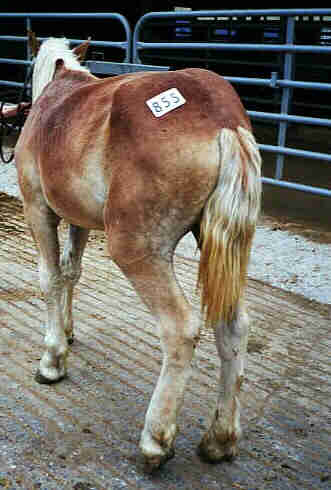 |
|
New Holland claimed that "she was bearing weight on all four legs" thus not in violation. Thanks to the EPN & PSP, those days of mis interpreting the law were over. |
Contrary to what has been published in numerous horse magazines (see below),and distributed by the American Horse Council and State Horse Councils, New Holland Sales Stables has accepted horses for sale that are in violation of the law, and "have severe welfare problems" as proven by court documents finding owners and haulers guilty of transporting and offering for sale horses in violation of Title 18, 5511(d). Dr. Temple Grandin, Department of Animal
Sciences,Colorado State University in a
report commissioned by USDA/ APHIS stated
in her report regarding New Holland and published
in The Horse in their December
issue; According to Dr. Temple Grandin,
|
|
Large Animal Protection SocietyLAPS -First time Maximum Fine imposed for in New Holland Court for selling sick, lame, and debilitated horses |
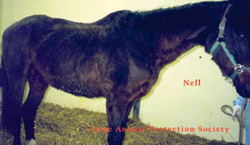 |
|
New Holland Police DepartmentAugust 2000 Mr. Sterling pled guilty to one count of cruelty to animals, Title 18, 5511(d). New Holland District Justice Hartman fined Mr. Sterling $50.00 plus costs, for a total of $125.00. |
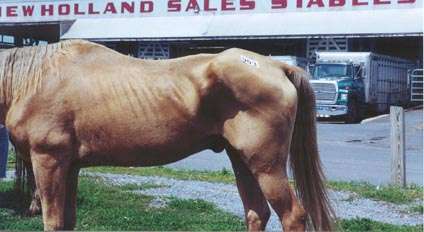 |
|
| PSPCA -October 2001 | ||
|
Larry Burke, Newfoundland, PA pleaded guilty on March 2, 2000 to transporting a disabled horse to the New Holland Sales Stables on February 21, 2000. New Holland District Justice Hartman fined Mr. Burke $125.50. The New Holland Police Department investigated the cruelty complaint. |
|
Large Animal Protection Society-LAPS Repeats the maximum fine imposed for in New Holland Court for selling sick, lame, and debilitated horses |
 |
Save America's Horses!
|
||||||

